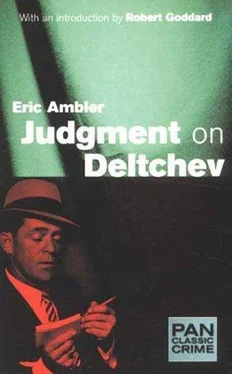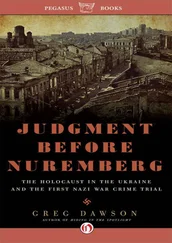Eric Ambler - Judgment on Deltchev
Здесь есть возможность читать онлайн «Eric Ambler - Judgment on Deltchev» весь текст электронной книги совершенно бесплатно (целиком полную версию без сокращений). В некоторых случаях можно слушать аудио, скачать через торрент в формате fb2 и присутствует краткое содержание. Год выпуска: 1977, ISBN: 1977, Издательство: Vintage, Жанр: Криминальный детектив, на английском языке. Описание произведения, (предисловие) а так же отзывы посетителей доступны на портале библиотеки ЛибКат.
- Название:Judgment on Deltchev
- Автор:
- Издательство:Vintage
- Жанр:
- Год:1977
- ISBN:9780307049971
- Рейтинг книги:4 / 5. Голосов: 1
-
Избранное:Добавить в избранное
- Отзывы:
-
Ваша оценка:
- 80
- 1
- 2
- 3
- 4
- 5
Judgment on Deltchev: краткое содержание, описание и аннотация
Предлагаем к чтению аннотацию, описание, краткое содержание или предисловие (зависит от того, что написал сам автор книги «Judgment on Deltchev»). Если вы не нашли необходимую информацию о книге — напишите в комментариях, мы постараемся отыскать её.
Judgment on Deltchev — читать онлайн бесплатно полную книгу (весь текст) целиком
Ниже представлен текст книги, разбитый по страницам. Система сохранения места последней прочитанной страницы, позволяет с удобством читать онлайн бесплатно книгу «Judgment on Deltchev», без необходимости каждый раз заново искать на чём Вы остановились. Поставьте закладку, и сможете в любой момент перейти на страницу, на которой закончили чтение.
Интервал:
Закладка:
I know a lot about Pashik now. I know, for instance, that the black dispatch case that he carried so importantly rarely contained anything but a stale meat sandwich and a revolver, that the seersucker suit was given to him when he was working in a Displaced Persons camp, that one of the fountain pens came from Passaic, New Jersey, and that those facts can be related directly to his death. I know now some of the ways in which his mind worked and of the strange fantasies that possessed it. Then, he was merely a name in conversation — ‘our man there, Pashik, will fix you up with all the permits you need’ — a figure waiting on a station platform. I was not expecting a man of destiny to meet me.
He shook my hand and smiled in a friendly way.
‘I’m delighted to know you, Mr Foster. Have you had breakfast?’
‘Not yet. It’s very kind of you to meet me.’
He gestured a denial. ‘I have my car outside. We’ll have to carry your luggage, Mr Foster. There are no porters at this hour.’
He spoke English well with an accent both foreign and American. He was not a prepossessing person. He had a plump, sallow face with several chins and a two days’ growth of beard, and his eyes, as brown and limpid as a spaniel’s, squinted slightly through the rimless glasses. He was businesslike and very courteous.
‘Good journey, Mr Foster?’ he asked as we walked out to his car.
‘Not bad.’
‘Any trouble at the frontier?’
‘No more than usual, I imagine.’
‘I’m very glad of that.’
In the station yard he put my suitcase in a battered Opel with no cushions on the back seats. He took my typewriter from me to put it with the suitcase and then paused, looking at it thoughtfully.
‘You know, Mr Foster,’ he said, ‘sometimes the authorities make a great deal of trouble for visitors who they think may not be favourable to the regime.’
‘Yes?’
‘Oh yes.’ He put the typewriter in the car and then, with his hand still on the carrying handle of it, turned his head. For a moment he seemed about to say something very important. It was on the tip of his tongue. Then he changed his mind. He shrugged. ‘Things are difficult right now, Mr Foster,’ he said. ‘I’m glad they made no trouble for you.’
He had an office in a building just off the Boulevard Marshal Sokolovsky. He called himself The Pan-Eurasian Press Service and represented a number of American and a few British newspapers whose proprietors had not found it necessary after the war to re-establish their own offices in the capital. He was energetic and gave an impression of efficiency. I had to be registered as a foreigner with the police and as a newspaper correspondent with the Ministries of the Interior and Propaganda; I also had to have a special permit for the trial. It was early evening before we had finished.
Although there was a good deal of waiting about in the various offices we visited, as well as the ordinary opportunities for conversation, our relationship did not progress during the day. For the most part he remained courteous but reserved, avoiding all discussions of Deltchev or the trial on the grounds, plainly insufficient at times, that we might be overheard, and introducing me to officials with a measured politeness that took no responsibility at all for my subsequent behaviour. He had very much the air of the man on the spot who, while giving the specialist from the head office all reasonable assistance, feels entitled to suspect that the results may not justify the trouble taken. This I could well understand; indeed, I would have shared the suspicion. What puzzled me as the day wore on was the growing realization that, understandable and appropriate though his attitude might be, it was only partly a disguise for professional jealousy and that he had some quite different anxiety about me to conceal. It manifested itself in curious ways: sudden bursts of cordiality followed by strained silences, moments when I looked up to find his brown myopic eyes contemplating me furtively, as if to assess my bank balance, and other moments, like that at the station, when he changed his mind about what he was going to say as he opened his mouth to say it. Evidently some bad news had arrived for me while I had been travelling, or he had a request to make that I would be likely to receive badly. The thought bothered me. Unfortunately, I already had a bad conscience about Pashik. I disliked him because of his smell.
I had become aware of it when we entered his car at the station. It was sour and musty and at first I was not sure whether it came from the car or its owner. I don’t think that I have an unduly fastidious nose or that the stinks of urban humanity specially distress me. I have known other people afflicted with what is daintily called body odour without disliking them. Yet Pashik I did dislike. Perhaps it was that the personality expressed by his appearance and manner — the suit, the American glasses, the dispatch case, the touch of complaisance — did not in some peculiar way allow for a bad smell. I remember that when I found that he was the source and not his car, I took note of those with whom we came in contact in case what I was finding offensive was the body smell of a city rather than that of one particular inhabitant. But no; it was Pashik. And then, unreasonably, I had begun to dislike him and so was at a disadvantage for what followed.
The sun had not yet set, but the shadows of a church spire and the dome of a mosque stretched like a finger and thumb across the St Mihail Square when we left the Propaganda Ministry for the last time that day and walked back to Pashik’s car; but I had my permit for the trial.
He waved my thanks aside mock-modestly.
‘We do what we can, Mr Foster.’ He had one of his moments of cordiality. ‘If you do not mind coming with me and waiting while I clear up at my office, I will then take you to dinner. There is a special restaurant I use.’
I would have liked to refuse; instead, I thanked him again.
There was a minute ante-room to his office, with a frosted glass door on which were painted the names of all the newspapers he represented. The list was long and imposing, and after it the office was an anticlimax. It contained a desk, a table, two chairs, and several filing cabinets. The window looked out on a tall fire escape well. It admitted warm stagnant air and a grey twilight that left the corners of the room in darkness. Standing on one of the filing cabinets and framed as importantly as if it were a picture of his wife was a publicity photograph of Myrna Loy, with a reproduction of her signature on it.
He turned on the desk lamp and began to go through a pile of message flimsies. Most of them he crumpled and tossed aside; two or three he scribbled on and handed to a youth with a glazed peak cap who had been awaiting his return; others he clipped together in a folder. When he reached the last of the messages, he gave the youth some money and sent him off. Then he picked up the telephone and had a conversation, to me quite unintelligible, with a woman whose voice I could hear vibrating tinnily in the receiver. It ended with a brief crescendo of negatives. He stood up and began to tidy the desk. He was frowning and ill at ease.
I watched him from the darkness outside the ring of light shed by the desk lamp. His small hands no longer moved surely. He was making up his mind to a difficult task. He stopped tidying to look out at me. Then he sat down again, leaned back, and, taking out a packet of American cigarettes, began to open it.
‘Mr Foster,’ he said very carefully, ‘there is a matter about which I have not yet spoken to you.’
Here it was.
‘Yes?’
He kept his eyes on the cigarette packet. ‘The matter of censorship. You know there is a strict censorship here, of course?’
Читать дальшеИнтервал:
Закладка:
Похожие книги на «Judgment on Deltchev»
Представляем Вашему вниманию похожие книги на «Judgment on Deltchev» списком для выбора. Мы отобрали схожую по названию и смыслу литературу в надежде предоставить читателям больше вариантов отыскать новые, интересные, ещё непрочитанные произведения.
Обсуждение, отзывы о книге «Judgment on Deltchev» и просто собственные мнения читателей. Оставьте ваши комментарии, напишите, что Вы думаете о произведении, его смысле или главных героях. Укажите что конкретно понравилось, а что нет, и почему Вы так считаете.












